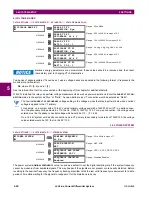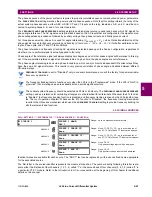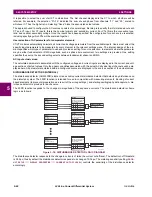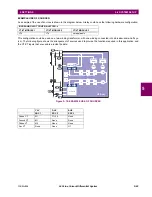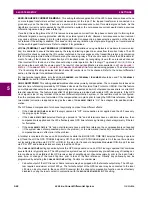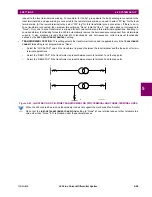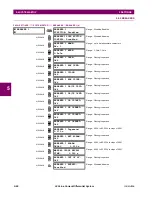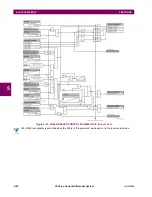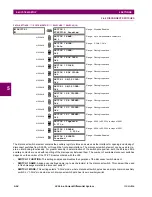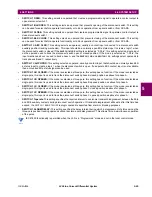
GE Multilin
L90 Line Current Differential System
5-91
5 SETTINGS
5.4 SYSTEM SETUP
5
A description of the operation of the breaker control and status monitoring features is provided in chapter 4. Only informa-
tion concerning programming of the associated settings is covered here. These features are provided for two or more
breakers; a user may use only those portions of the design relevant to a single breaker, which must be breaker 1.
The number of breaker control elements is dependent on the number of CT/VT modules specified with the L90. The follow-
ing settings are available for each breaker control element.
•
BREAKER 1 FUNCTION:
This setting enables and disables the operation of the breaker control feature.
•
BREAKER1 PUSH BUTTON CONTROL:
Set to “Enable” to allow faceplate push button operations.
•
BREAKER 1 NAME:
Assign a user-defined name (up to six characters) to the breaker. This name will be used in flash
messages related to breaker 1.
•
BREAKER 1 MODE:
This setting selects “3-Pole” mode, where all breaker poles are operated simultaneously, or “1-
Pole” mode where all breaker poles are operated either independently or simultaneously.
•
BREAKER 1 OPEN:
This setting selects an operand that creates a programmable signal to operate an output relay to
open breaker 1.
•
BREAKER 1 BLK OPEN
: This setting selects an operand that prevents opening of the breaker. This setting can be
used for select-before-operate functionality or to block operation from a panel switch or from SCADA.
•
BREAKER 1 CLOSE:
This setting selects an operand that creates a programmable signal to operate an output relay
to close breaker 1.
•
BREAKER 1 BLK CLOSE
: This setting selects an operand that prevents closing of the breaker. This setting can be
used for select-before-operate functionality or to block operation from a panel switch or from SCADA.
•
BREAKER 1
A/3P CLOSED:
This setting selects an operand, usually a contact input connected to a breaker auxil-
iary position tracking mechanism. This input should be a normally-open 52/a status input to create a logic 1 when the
breaker is closed. If the
BREAKER 1 MODE
setting is selected as “3-Pole”, this setting selects a single input as the oper-
and used to track the breaker open or closed position. If the mode is selected as “1-Pole”, the input mentioned above
is used to track phase A and the
BREAKER 1
B
and
BREAKER 1
C
settings select operands to track phases B and C,
respectively.
•
BREAKER 1
A/3P OPND:
This setting selects an operand, usually a contact input, that should be a normally-closed
52/b status input to create a logic 1 when the breaker is open. If a separate 52/b contact input is not available, then the
inverted
BREAKER 1 CLOSED
status signal can be used.
•
BREAKER 1
B CLOSED:
If the mode is selected as three-pole, this setting has no function. If the mode is selected
as single-pole, this input is used to track the breaker phase B closed position as above for phase A.
•
BREAKER 1
B OPENED:
If the mode is selected as three-pole, this setting has no function. If the mode is selected
as single-pole, this input is used to track the breaker phase B opened position as above for phase A.
•
BREAKER 1
C CLOSED:
If the mode is selected as three-pole, this setting has no function. If the mode is selected
as single-pole, this input is used to track the breaker phase C closed position as above for phase A.
•
BREAKER 1
C OPENED:
If the mode is selected as three-pole, this setting has no function. If the mode is selected
as single-pole, this input is used to track the breaker phase C opened position as above for phase A.
•
BREAKER 1 Toperate
: This setting specifies the required interval to overcome transient disagreement between the
52/a and 52/b auxiliary contacts during breaker operation. If transient disagreement still exists after this time has
expired, the
BREAKER 1 BAD STATUS
FlexLogic operand is asserted from alarm or blocking purposes.
•
BREAKER 1 EXT ALARM:
This setting selects an operand, usually an external contact input, connected to a breaker
alarm reporting contact.
•
BREAKER 1 ALARM DELAY:
This setting specifies the delay interval during which a disagreement of status among
the three-pole position tracking operands will not declare a pole disagreement. This allows for non-simultaneous oper-
ation of the poles.
If single-pole tripping and reclosing is used, the breaker may trip unsymmetrically for faults. In this case, the minimum
alarm delay setting must exceed the maximum time required for fault clearing and reclosing by a suitable margin.
•
MANUAL CLOSE RECAL1 TIME:
This setting specifies the interval required to maintain setting changes in effect after
an operator has initiated a manual close command to operate a circuit breaker.
•
BREAKER 1 OUT OF SV:
Selects an operand indicating that breaker 1 is out-of-service.
Summary of Contents for UR Series L90
Page 652: ...A 16 L90 Line Current Differential System GE Multilin A 1 PARAMETER LISTS APPENDIX A A ...
Page 772: ...B 120 L90 Line Current Differential System GE Multilin B 4 MEMORY MAPPING APPENDIX B B ...
Page 802: ...C 30 L90 Line Current Differential System GE Multilin C 7 LOGICAL NODES APPENDIX C C ...
Page 812: ...D 10 L90 Line Current Differential System GE Multilin D 1 IEC 60870 5 104 APPENDIX D D ...
Page 824: ...E 12 L90 Line Current Differential System GE Multilin E 2 DNP POINT LISTS APPENDIX E E ...
Page 834: ...F 10 L90 Line Current Differential System GE Multilin F 3 WARRANTY APPENDIX F F ...
Page 846: ...xii L90 Line Current Differential System GE Multilin INDEX ...




